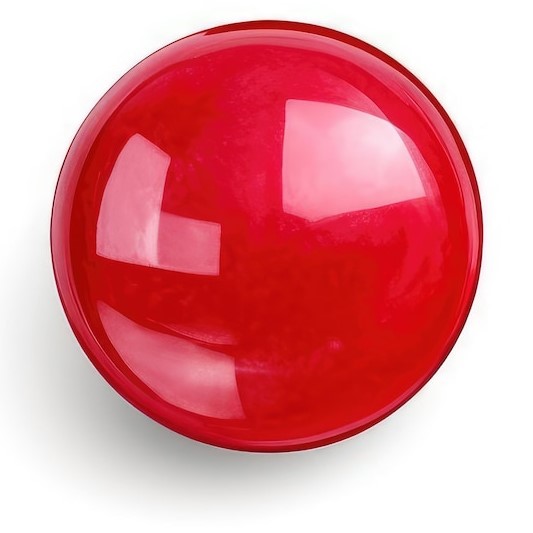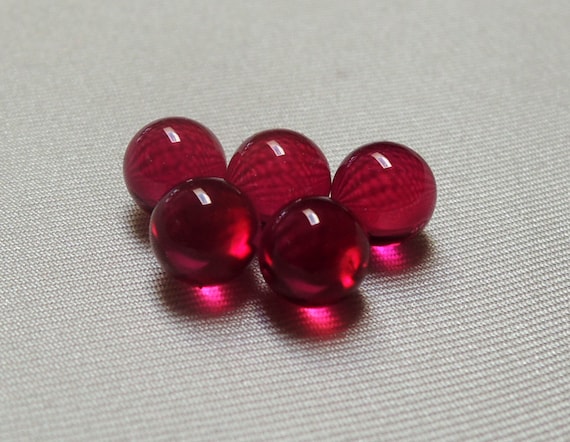Home / What Are Ruby Ball Bearings Used For?
What Are Ruby Ball Bearings Used For?
Understand the usage of ruby ball bearings and their benefits
Ruby ball bearings, often simply referred to as ruby bearings, are tiny ball components that play an extremely important role in various industries, ensuring that devices and machinery operate with perfection and efficiency. There are many elements that set ruby ball bearings apart from their counterparts, such as their longevity, their extreme resistance, their simple use, and of course, their beautiful red aesthetic. Let’s dive into more details in order to understand the benefits of ruby ball components and the usage of this useful jewel.
What are jewel bearings used for?
Jewel bearings, as the name suggests, are bearings made from precious or semi-precious stones. Jewel ball applications, which include ruby, sapphire, and others, are not just chosen for their aesthetic appeal but for their exceptional mechanical properties that make them ideal for specific applications.
Gemstones like ruby and sapphire rank just below diamond on the Mohs scale of hardness. Their hardness translates to remarkable wear resistance, ensuring that jewel bearings can function optimally for extended periods without showing signs of degradation. Their smooth surfaces also mean reduced friction, leading to smoother operation of devices.

Bearings balls are usually used within jewelry or accessory pieces, measuring instruments, from meters to gauges, and medical instruments. Their ability to maintain consistent performance over time ensures accurate readings, making them invaluable in scientific and industrial settings.
The benefits of using ruby balls as bearings
There are many special benefits to using ruby balls as a jewel bearing.
Firstly, their chemically inert and extremely resistant to abrasion properties help those gemstone balls remain unaffected by most substances they come into contact with, making them ideal for environments where chemical reactions can be a concern. This strong and inert chemical appeal also means that they don’t easily corrode, ensuring longevity in their applications.
Additionally, their extreme resistance to abrasion demonstrates their durability. Whether they’re used in a high-speed device or a piece of machinery that sees a lot of wear and tear, ruby ball bearings can withstand it all without showing signs of degradation. This resistance speaks volumes on the quality of the ruby as, a material used for bearing.
Ruby balls are also auto lubricant and easy polishing materials. This means that ruby ball bearings require minimal maintenance, as they naturally reduce friction without the need for external lubricants. This not only reduces the cost and time spent on maintenance but also ensures that the bearings function optimally at all times.
Lastly, their easy polishing materials make them a favorite in industries where aesthetics matter. The natural shine and luster of ruby can be easily enhanced with minimal polishing, making these bearings not just functionally superior but also visually appealing.
How does the hardness of ruby ball bearings compare to other materials?
Silicon
Silicon is widely used in many industries due to its semiconductor properties. However, when it comes to hardness and resistance to abrasion, silicon falls short in comparison to ruby. While Silicon is celebrated for its semiconductor properties and is pivotal in the electronics industry, its hardness is considerably less than that of ruby. This makes Silicon more susceptible to wear and abrasion over time, especially in applications where constant friction is a factor.
Sapphire Crystal
Sapphire Crystal, used in engineering, shares many crystal wear-resistant properties with ruby, given that they’re both related to the corundum family. Yet, while the sapphire crystal is undeniably hard and durable and revered for its transparency, this type of sapphire tends to lack precision and minimal wear. This can lead to potential inconsistencies in certain high-precision applications. While this type of sapphire has its advantages and is a formidable material in its own right, ruby ball bearings offer a consistent blend of hardness and uniformity, making them a preferred choice in many precision-driven scenarios.
Zirconia
Zirconia, often referred to as ceramic steel, is lauded for its strength and toughness. It’s frequently used in applications where metal bearings might corrode or degrade. However, while Zirconia boasts commendable hardness and resistance to crack propagation, it can be more susceptible to wear in certain conditions compared to ruby. Additionally, Zirconia’s toughness, though a strength, can sometimes lead to challenges in ultra-precision applications where the consistent hardness of ruby is essential.
Ceramic
Ceramic jewels might offer specific advantages in particular applications, but when it comes to a balance of hardness, durability, and precision, ceramic might fall short. While they are celebrated for their heat resistance and overall hardness, they can be brittle, making them prone to chipping or cracking under impact or when subjected to sudden temperature changes.
Glass
Glass is a material appreciated for its transparency and versatility. It can be molded into intricate shapes, making it a favorite in decorative and optical applications. However, when it comes to hardness and durability, glass has its limitations. It is inherently brittle and can shatter or crack upon impact or when exposed to rapid temperature fluctuations. Additionally, glass bearings can wear down more quickly when subjected to continuous friction, especially in environments with contaminants.
Ruby
Ruby, in its natural form, is one of the hardest known materials, second only to diamonds. This intrinsic hardness gives ruby ball bearings an edge, especially when it comes to wear and tear resistance. It can function for extended periods without significant degradation, even in environments with high friction. Its vibrant red hue, a result of traces of chromium, not only adds aesthetic appeal but also contributes to its resistance to various chemicals, making it less prone to corrosion or reactions. However, while it’s incredibly hard, it can ship or crack when subjected to sharp impacts.
Still, while many materials bring their own set of advantages and weaknesses to the table, ruby’s exceptional hardness, combined with its other standout features, positions it as one of the most efficient materials used in precision ball bearings.
Why are ruby ball bearings preferred in certain optical applications?
In various technical industries, ruby ball bearings are famously used in devices where the slightest margin of error can have significant consequences.
Especially when it comes to horology. These gemstone balls are used in watches where these balls offer precision timing and durability is needed. The jewelry and horology industry relies heavily on the durability and accuracy of its internal components. Ruby balls used as bearings ensure that these timepieces run seamlessly. Their natural resistance degradation makes it the mechanisms of watches remain unaffected by factors that might typically wear down other materials.

Furthermore, their usage in optical devices is particularly noteworthy. One of the standout features of ruby is its ability to minimize reflection. In optical applications, any form of reflection or refraction can distort the final output. So, rubies are used to minimize reflection for optical applications. Ruby balls used as bearings ensure that optical devices produce clear, undistorted images or readings. This makes them an ideal choice for devices ranging from high-end cameras to precise medical instruments.
The preference for ruby ball bearings in certain optical applications isn’t just a matter of choice; it’s a testament to their unparalleled properties that cater perfectly to the demands of precision and clarity. Whether used for watches or optical devices, ruby balls help produce the most efficient instruments when used within any industry.
What sizes and materials are available for ruby ball bearings?
Sizes and Specifications
Our ruby ball products are available in a wide spectrum of sizes. Small balls are perfect for intricate optical devices, while larger balls are suited for industrial applications.
1mm Ruby Balls: At this size, our balls are perfect for applications that demand precision in compact spaces, such as luxury watches or micro-machinery.
Mid-Range (4mm to 8mm) Ruby Balls: These are the versatile workhorses of our collection. Ideal for various applications, from optical instruments to precision engineering tools, these balls balance size and functionality.
Larger Sizes (10mm to 16mm) Ruby Balls: Our larger balls are designed for applications that require durability in more demanding environments. Whether it’s in heavy-duty industrial equipment or advanced aerospace applications, these gemstone balls deliver
We offer the highest-quality Rubys
Our ruby products are meticulously sculpted, ensuring that these sculpted balls exhibit all the standout properties (hardness, wear resistance, chemical inertness, longevity, and more), making our ruby balls the perfect choice for bearings. Furthermore, our dedication to excellence extends to every stage of the production process. From sourcing the finest raw products to testing the jewels and the final polishing phase, every step is executed with precision, ensuring that our ruby balls are not just functionally superior but also aesthetically impeccable.
Discover the Precision of Our Ruby Ball Bearings
You’ve delved into the world of ruby ball bearings, understood their usage and properties, and seen the diverse range we offer. Now, it’s time to experience the excellence firsthand.
Request a quote and we’ll prepare your delivery. Order online your custom Ruby Balls now. – Learn how our professional US team at Analytical Components LLC makes them to your Precise Specifications!
